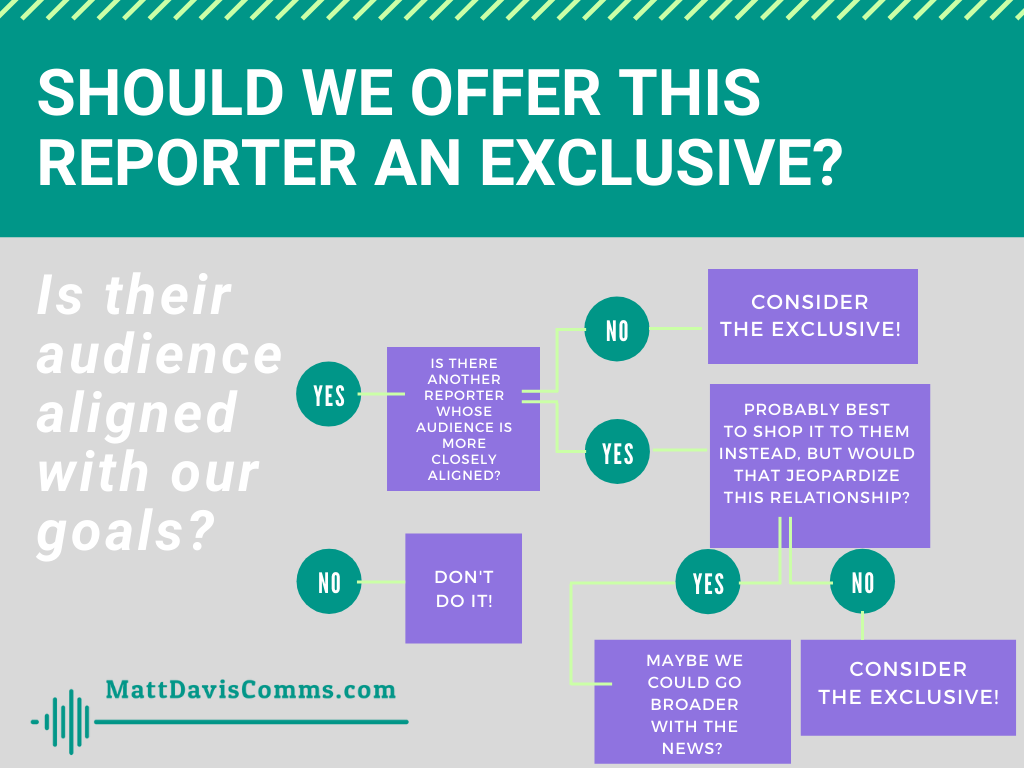
As a “comms whisperer” I’m often brought in when people have a handful of reporters they’ve been talking to, but aren’t sure how to best to leverage those relationships to get coverage for their brand, product, or launch. A question that often comes up at that point is whether to offer an exclusive to one of the reporters. An exclusive means giving one reporter a piece of news without telling any other reporter. The hope is that you’ll get more prominent and extensive coverage as a result of giving them the news first. Or at the very least, you’ll secure some press coverage when you weren’t sure you might have done before. It can be a tempting strategy if you’re not sure your story is very newsworthy—in which case I’d encourage you to try to make your story more newsworthy, rather than shop it as an exclusive! Giving an exclusive can also be a good idea if there’s a reporter at a specific outlet who you’d like to court.
But answering the exclusive question should start with your goals.
Let’s say you’re solving the problem of expensive, energy inefficient light bulbs. You’ve got an economic and efficient prototype light bulb. But you need investors to scale your production. You need retailers to carry the product. And you need the public to know about the bulbs and start trying them. That means you’ve got three audiences: Venture capital investors, retailers, and consumers. Now let’s say your handful of reporters includes a writer for a lifestyle brand like Oprah. They’re been making noises at you for a while, telling you they love the idea of your new light bulb. And they want to write a story about it for Oprah’s audience.
Should you give them the exclusive?
No. In this case, that would be a bad idea. Because you’d end up with a great story that generates huge demand for your product — but you haven’t yet scaled up its production with investment, or got it into enough stores to meet the demand! If you’re going to give anyone an exclusive at this point, it should be the reporter who writes for investors. You’d tell them: “We’ve got a product that halves energy costs for consumers, and investors are picking up on it. We wanted to come to you with an exclusive story pitch because we want to reach your audience, and we want to make a big splash. We’re hoping to raise our production goals by a hundred-fold this year.”
You’ll notice that I didn’t factor in how nice the reporter is. Or whether you’ve known them for years. Or whether you like the brand they’re writing for. Those can be false friends in the decision-making process around an exclusive. At the end of the day, you need to figure out what’s in your best interests. And start there.
Do reporters resent it when you give an exclusive to someone else?
No. Reporters usually understand why you’ve gone to a competitor with an exclusive pitch. It can help, too, to tell a disgruntled reporter about your thinking process, if they do ask. So in this case, for example, you might get a call from your interested Oprah reporter. They might ask why you’ve gone to the investment press with a story about the bulbs, especially when they’d been asking you for the story for a while. You can say, “I’m sorry. I do want to give you something exclusive. But we want to make sure the time is right. And we’ll come back to you with something later when we’ve ramped up production.”
The thing is, though, your next key audience is likely to be retailers. Once you’ve scaled up production, you might want to give an exclusive there. Be sure you can honor your commitments.
Why not issue the story on a broader basis?
Exclusives aren’t always the best way to get your news out. If your product is remarkable, you may decide that a lot of reporters will want to write about it anyway, regardless of whether they get the news first. If we’re confident that what we’re doing is newsworthy, then it makes more sense to pitch the story far and wide, and even issue a press release. Most of us, of course, exist in that borderland shy of announcing we’re taking our new space rocket to the moon. And that’s where the exclusive can help glean some extra mileage for our story. Particularly when one piece of coverage in the right outlet can make all the difference.
This all assumes you’re controlling the news flow
With more than five publicists to every journalist, many of us think we control things. But a good reporter, and I like to think I used to be one, will go and find stories without relying on PR people, sometimes. If what you’re doing is remarkable enough, then you might want to get the jump on a reporter’s initiative. Or they’ll control the story and tell it their way. That’s actually how things were always supposed to work, actually. But this is 2021. And people pay me to be a strategic communications consultant. Not a sentimental idealist.


